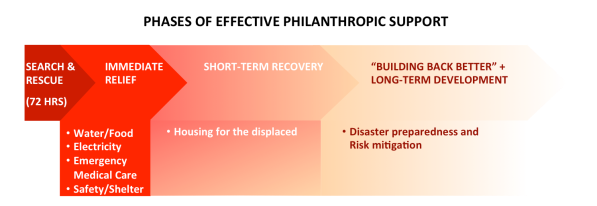On Monday, May 20th a tornado hit the area of Moore, Oklahoma, bringing winds of over 190 miles per hour and a path of destruction estimated at 20 miles long and 2 miles wide. Schools, homes, and businesses have been destroyed. It may still be too early to report the total number of people killed, though as of today, two dozen are confirmed dead. Over 200 have been reported injured so far. President Obama has declared the area a federal disaster, Federal Emergency Management Agency (FEMA) officials have been dispatched, and members of the Oklahoma City police force are assisting with rescue efforts.
For donors who want to help, here is what you need to know:
All disasters, whether natural or man-made, involve different phases of relief and recovery.
Search & Rescue and Immediate Relief Phase
Support First Responders Through Financial Contributions (NOT donated products or volunteering): In Oklahoma, we are still in the first phase where the emphasis is on search and rescue efforts and addressing the immediate needs of survivors. This can be difficult, often specialized work that requires experience in previous disaster situations and a high level of coordination. Although many donors may be moved to volunteer or to donate items such as food, clothes, or blankets, such well-intentioned efforts are often not helpful. They can actually complicate relief efforts by adding an additional burden of securing warehouse space or managing non-critical volunteers. Instead, you can best help by providing financial donations to first-responder nonprofits. Such donations allow first responders to get what is needed faster and more cost-effectively and to respond flexibly as needs on the ground change.
The following are first-responder nonprofits working on the ground in the affected area:
- The American Red Cross/Oklahoma Red Cross is currently operating a shelter in Moore and continues to operate three shelters in Oklahoma City as the threat of further tornadoes continues. Red Cross volunteers are providing food and supplies to search and rescue first responders, who are still making their way through the wreckage. Kitchen support trailers have also been placed to provide meals to those who have lost their homes. People who wish to make a donation can support the American Red Cross Disaster Relief, which helps provide food, shelter, and emotional support to those affected by disasters like the recent tornadoes in Oklahoma by:
- visiting their website
- dialing 1-800-REDCROSS
- texting REDCROSS to 90999 (to make a $10 donation)
- The Salvation Army is organizing disaster response units in the area and sending mobile kitchens than can serve meals to 2,500 people a day. Here are three ways to donate:
- Donate at their website.
- Text STORM to 80888 (to make a $10 donation).
- Send a check with the memo “Oklahoma Tornado Relief” to: The Salvation Army, P.O. Box 12600, Oklahoma City, OK., 73157.
- Feeding America, with its network of more than 200 food banks, is preparing to deliver truckloads of food, water, and other supplies to Moore. Their efforts help support first responders like the Red Cross and the Salvation Army. The Regional Food Bank of Oklahoma, a Feeding America member food bank, is coordinating food boxes to help affected residents and is strongly discouraging donating items.
- Save the Children has deployed its Child Friendly Space kits to local shelters and is preparing to deploy infant and toddler hygiene materials to support families with small children. As we discussed in our analysis of the healing classrooms model, implemented by the International Rescue Committee (IRC), creating child-friendly places that serve as oases of normalcy are critical for children and families in the immediate aftermath of a traumatic event.
Short to Long-Term Recovery Phases
Consider donating to a relief fund to help beyond the initial, immediate relief phases: The hard work of disaster relief goes far beyond the search/rescue and immediate relief phases. While the media and donor attention is on the immediate need, local organizations are raising funds to be deployed once the initial search and rescue efforts are completed. Such funds are important because the community need far outlasts media and donor attention spans. Two examples of such funds:
- United Way of Central Oklahoma is activating a disaster relief fund today so that individuals can specifically donate to tornado relief-and-recovery efforts. Fund dollars will be distributed without administrative fees to United Way Partner Agencies working on the tornado relief efforts. Donations can be made the following ways:
- Give on their website.
- Send checks with the memo “May Tornado Relief” directly to the United Way of Central Oklahoma, P.O. Box 837, Oklahoma City, OK , 73101.
- For more information, contact Karla Bradshaw at kbradshaw@unitedwayokc.org.
- Tulsa Community Foundation, the nation’s largest community foundation, has established the Moore & Shawnee Tornado Relief Fund. This fund has already received a lead gift of $100,000 from George Kaiser Family Foundation. Contributions to the Moore & Shawnee Tornado Relief Fund can be made:
- securely online via their website
- via checks mailed to Tulsa Community Foundation offices at 7030 South Yale Avenue, Suite 600, Tulsa, OK, 74136
“Building Back Better”: Know that needs will evolve and change
Many donors are drawn by immediate needs. Addressing urgent issues—such as medical care, food, and emergency shelter for survivors—is essential. However, many of the highest impact opportunities may come from “building back better” and prevention and mitigation efforts such as expanding safe shelter in areas prone to such natural disasters. As the Center for Disaster Philanthropy points out, effective disaster philanthropy often requires sustained attention to the evolving needs of the affected community. In other words, it requires knowing that while the headlines may fade, the opportunity for you to have impact does not.

